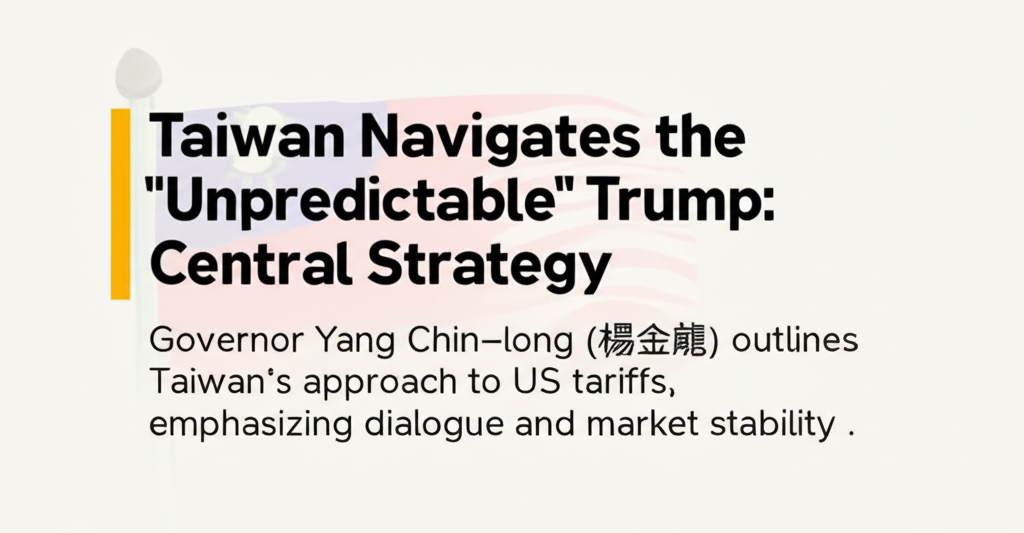Taiwan Navigates the "Unpredictable" Trump: Central Bank's Strategy
Governor Yang Chin-long (楊金龍) outlines Taiwan's approach to US tariffs, emphasizing dialogue and market stability.

Taipei, April 10 - In response to the fluctuating trade policies of the United States, Taiwan's central bank governor, Yang Chin-long (楊金龍), has outlined a strategic approach to navigate the complexities introduced by President Donald Trump's tariff decisions.
Following the implementation of reciprocal tariffs, which included a temporary 90-day pause coupled with a baseline 10% tariff for most countries, the Governor addressed a legislative committee, providing insights into Taiwan's strategy.
Governor Yang suggested that the sudden policy shift by the United States may have been influenced by the initial negative reaction in US stock markets after the tariffs were implemented. He also highlighted the subsequent surge in both the US and Taiwan markets following the announcement of the pause.
During the legislative session, Kuomintang Legislator Lin Te-fu (林德福) raised concerns that despite the pause, Taiwan was still facing a 32% tariff. In response, Yang explained that the U.S. formula for reciprocal tariffs, while broad, was designed to apply universally, not specifically targeting Taiwan.
Addressing the challenges, Governor Yang stated that the best approach involves reasonable dialogue with the US. He highlighted that Taiwan's trade surplus with the US is largely due to the US's demand for Taiwanese products, thus Taiwan contributes to US productivity.
On the topic of reciprocal tariffs, Yang said that if multiple countries engage the U.S. in discussions, it could be more effective in achieving "reciprocity." Furthermore, he acknowledged the market uncertainty caused by President Trump's policies, and emphasized that open communication is the key.
He also considered the suggestion from legislators about leveraging Taiwan's holdings of U.S. Treasury securities as a negotiating point. He noted that such a move could highlight how Taiwan's support in long-term U.S. Treasury holdings helps manage financial costs for the US.
When queried about a potential bear market for the Taiex index, Yang admitted the current high level of uncertainty. In contrast, Financial Supervisory Commission (FSC) Chairman Peng Jin-lung (彭金隆) asserted that a bear market was not yet in effect and there was no immediate systemic risk.
Meanwhile, Finance Minister Chuang Tsui-yun (莊翠雲) noted the possibility of increasing the National Financial Stabilization Fund to stabilize the market. Economics Minister Kuo Jyh-huei (郭智輝) announced the upcoming plan for business bailouts to counteract the new U.S. tariffs.
Other Versions
Taiwán navega por el "impredecible" Trump: La estrategia del Banco Central
Taïwan fait face à l'"imprévisible" Trump : La stratégie de la banque centrale
Taiwan Menghadapi Trump yang "Tidak Dapat Diprediksi": Strategi Bank Sentral
Taiwan affronta il "imprevedibile" Trump: La strategia della Banca centrale
台湾はトランプ大統領を予測できない:中央銀行の戦略
대만, '예측할 수 없는' 트럼프를 탐색하다: 중앙은행의 전략
Navega ng Taiwan ang "Hindi Mahulaan" na Trump: Estratehiya ng Central Bank
Тайвань ориентируется на "непредсказуемого" Трампа: Стратегия Центрального банка
ไต้หวันรับมือทรัมป์ผู้ "คาดเดาไม่ได้": กลยุทธ์ของธนาคารกลาง
Warning: Undefined array key "main_id" in /web/htdocs/www.mytaiwanlife.com/home/news/news.php on line 130
Warning: Undefined array key "lang_slug" in /web/htdocs/www.mytaiwanlife.com/home/news/news.php on line 130
